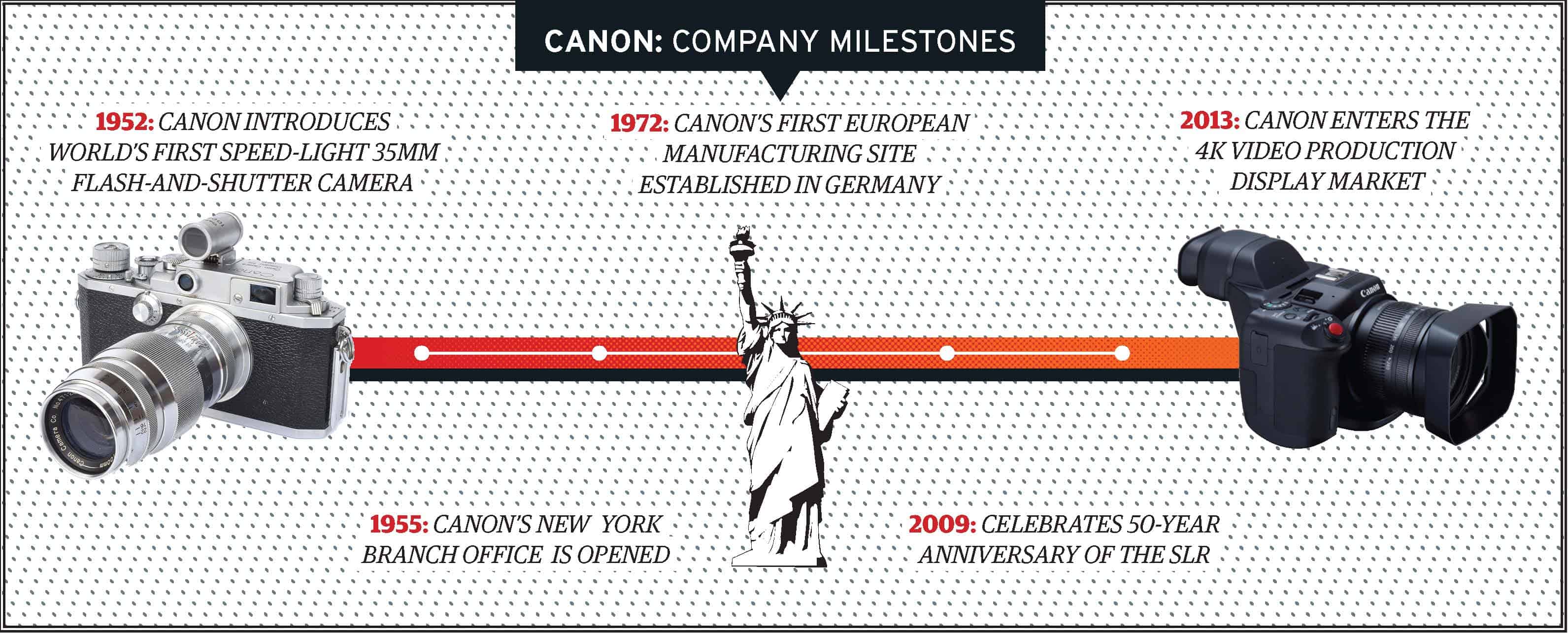Philip Brady, examines how technology has disrupted traditional sectors and how global organisations are adapting to change.
Q: Can you tell me about the investments and developments for Canon here in Ireland?
Canon has been in Ireland since 1990 and in that time has grown and differentiated itself from other competitors, maintaining a service and support structure for both office and consumer products in Ireland.
From a sales perspective, Canon operates a dual market strategy with a direct sales presence nationwide for office products. For its consumer range, Canon sells through retailers nationwide. Globally, Canon invest 8% of its annual revenues in R&D.
In 2013, the company was granted 3,825 patents in the US, placing it third among all corporations. Canon was ranked 35th in Interbrand’s 100 Best Global Brands 2013 survey and 26th in Interbrand’s Best Global Green Brands 2014 survey.
Canon is always looking to grow by acquisition. Its most recent acquisition was Océ and Milestone and the company is currently in the process of acquiring Axis, making Canon a leader in security network cameras.
Q: How is the tech industry in Ireland performing and what do you attribute this to?
The software, engineering and life sciences sectors – the fastest growing sectors for exports by indigenous Irish companies – are growing at 15-20% per annum. I think initially our tax rates were the driver for this, beyond that it is the availability of highly skilled IT professionals that has attracted high profile companies that continue to expand, such as Google, Facebook, Twitter, Intel and Microsoft.
Organisations like the IDA and Enterprise Ireland have and continue to play a crucial role in attracting cutting-edge companies here. We are also seeing Irish technology companies really make an impact (Stripe and Trustev are only two examples) on an international level. We punch above our weight here, and there is no reason why we couldn’t be one of the main technology hubs in Europe for new companies.
Q: How how important is Ireland to Canon’s global operations?
From an Irish perspective, last year we were the number one photography brand for volume and value. Across the whole camera category, Canon grew its market share from 30% to over 40%.
In the DLSR category, we increased market share from 52% to nearly 60% in value. This coupled with our solutions gives us the most comprehensive offerings to the market.
Ireland is on course to be the fastest-growing economy in the eurozone for 2015 with a predicted growth rate of 4%. Given the presence of so many large multinationals in Ireland, it is important from a strategic position that Canon has a presence to service the needs of our global customers. Ireland has returned to being a growing market for Canon and we predict growth by 24% in the next three years.
Q: Why is Canon continuing to invest in Ireland?
Given the presence of so many large multinationals in Ireland it is important from a strategic position that we have presence to service the needs of our global customers. Ireland has returned to being a growing market for Canon and we predict growth by 24% in the next three years.
Q: What are the challenges facing the tech industry going forward?
Mobile devices continue to disrupt changes and we will see smartphones reach 80% adoption by the end of 2015. But I predict that sales of mobile device sales will start to level out as almost everyone will have one.
One major change coming will be the national roll-out of fibre broadband, which will finally bring speeds nationwide, which will put us on a par with other EU countries. For Ireland, I think we still have key advantages; our workforce is still one of the youngest and best educated in the EU. Having English as our mother tongue coupled with a competitive cost base and easy access to the EU makes us attractive for investment.
Obviously, we will continue to maintain our favourable tax rate, but we need to look at new sectors as well. For example, the green and cleantech sector is very promising and we could see Ireland develop a significant offering here. The IDA is progressing this with a view to creating a major investment hub for cleantech.
But we have challenges on the horizon – namely wage control – as our economy starts to grow again, the spectre of inflation could reappear. As this could drive wage inflation, dramatic wage increases could erode our key advantage of a cost effective workforce. Addressing the high personal tax rates could be a more effective way of keeping control on large wage increases.
The ending of the ‘double Irish’ tax loophole will have some effect on tech companies investment in Ireland. And no doubt, the 12.5% tax rate will be put under pressure by the EU.
Science, technology, engineering and maths (STEM) education is undergoing Government review as tech, pharma and science companies may struggle to fill vacancies. This needs a broad ranging change from educational institutions to ongoing vocational and ‘in company’ training, the benefits of which will be manifold.

Q: Are employers finding any skills gaps in the market?
From our perspective, we will see challenges on a few fronts. Tech has disrupted many traditional sectors and finding people with existing or new tech skills could be a challenge. Data literacy has become a mainstream job requirement and understanding data and insights will be key. While new employees may be tech savvy, an ability to code may be essential in the future. Coding soon be as relevant as a driving licence or the ability to use Microsoft Office.
Q: Has the upsurge in the quality of mobile phones had a negative impact on Canon cameras?
Of course, the ubiquitous use of smart phones as a camera has had an effect on camera sales. The effect has been both positive and negative. For basic snaps and everyday use people will now use their camera phone, however, it does increase the pool of photographers. Many of them are migrating to using DSLR or high-end compact cameras which will give them high-quality images that a camera phone just cannot produce.
Q: Does Canon treat the creation of ‘advanced amateur’ cameras in the same way as top of the range professional models?
Very much so. Many of the more advanced features that would have been on professional cameras now appear on mid-range and amateur cameras. If you were to compare a current mainstream camera to one from five years ago, you would see a huge leap in terms of features and innovation.
Q: What are your main priorities and goals in your role?
Canon wish to have some involvement in every image produced, be it creation, printing or document management. For me, it is growing Canon’s presence and services across different sectors.
Traditionally, Canon focused purely on print, whereas now our focus has expanded to full document management. This is now a key growth opportunity for Canon as it has become an important area for businesses given the growing demands for compliance. I am also very focused on ensuring we recruit, train and maintain the best staff possible as our business really is built on them.
Q: How do you define success and what drives you to succeed?
I think success relies on the following and is very much my focus:
Staff retention is important to me as you can only really succeed when you have great employees around you. I’ve always believed in mentors and I have one to this day. They can give you the unvarnished truth or an insight that can make all the difference.
It’s also vital to get the work/life balance right. We all need to recharge and live our lives.
I also believe that you should never get too comfortable, if you do, you stop learning and can plateau in terms of your career.







